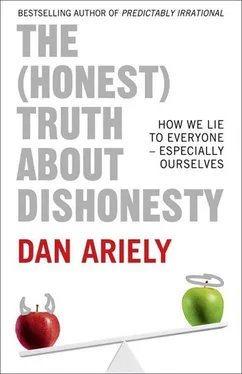Ariely, Dan - The (Honest) Truth About Dishonesty - How We Lie to Everyone – Especially Ourselves
Здесь есть возможность читать онлайн «Ariely, Dan - The (Honest) Truth About Dishonesty - How We Lie to Everyone – Especially Ourselves» весь текст электронной книги совершенно бесплатно (целиком полную версию без сокращений). В некоторых случаях можно слушать аудио, скачать через торрент в формате fb2 и присутствует краткое содержание. Жанр: Старинная литература, на английском языке. Описание произведения, (предисловие) а так же отзывы посетителей доступны на портале библиотеки ЛибКат.
- Название:The (Honest) Truth About Dishonesty: How We Lie to Everyone – Especially Ourselves
- Автор:
- Жанр:
- Год:неизвестен
- ISBN:нет данных
- Рейтинг книги:4 / 5. Голосов: 1
-
Избранное:Добавить в избранное
- Отзывы:
-
Ваша оценка:
- 80
- 1
- 2
- 3
- 4
- 5
The (Honest) Truth About Dishonesty: How We Lie to Everyone – Especially Ourselves: краткое содержание, описание и аннотация
Предлагаем к чтению аннотацию, описание, краткое содержание или предисловие (зависит от того, что написал сам автор книги «The (Honest) Truth About Dishonesty: How We Lie to Everyone – Especially Ourselves»). Если вы не нашли необходимую информацию о книге — напишите в комментариях, мы постараемся отыскать её.
The (Honest) Truth About Dishonesty: How We Lie to Everyone – Especially Ourselves — читать онлайн бесплатно полную книгу (весь текст) целиком
Ниже представлен текст книги, разбитый по страницам. Система сохранения места последней прочитанной страницы, позволяет с удобством читать онлайн бесплатно книгу «The (Honest) Truth About Dishonesty: How We Lie to Everyone – Especially Ourselves», без необходимости каждый раз заново искать на чём Вы остановились. Поставьте закладку, и сможете в любой момент перейти на страницу, на которой закончили чтение.
Интервал:
Закладка:
Daylian M. Cain, George Loewenstein, and Don A. Moore, “When Sunlight Fails to Disinfect: Understanding the Perverse Effects of Disclosing Conflicts of Interest,” Journal of Consumer Research (in press).
Carl Elliot, White Coat, Black Hat: Adventures on the Dark Side of
Medicine (Boston: Beacon Press, 2010).
Chapter 4. Why We Blow It When We’re Tired
Based on
Mike Adams, “The Dead Grandmother/Exam Syndrome and the Potential Downfall of American Society,” The Connecticut Review (1990).
Shai Danziger, Jonathan Levav, and Liora Avnaim-Pesso, “Extraneous Factors in Judicial Decisions,” Proceedings of the National Academy of Sciences of the United States of America (2011).
Nicole L. Mead, Roy F. Baumeister, Francesca Gino, Maurice E. Schweitzer, and Dan Ariely, “Too Tired to Tell the Truth: Self-Control Resource Depletion and Dishonesty,” Journal of Experimental Social Psychology (2009).
Emre Ozdenoren, Stephen W. Salant, and Dan Silverman, “Willpower and the Optimal Control of Visceral Urges,” Journal of the European Economic Association (2011).
Baba Shiv and Alexander Fedorikhin, “Heart and Mind in Conflict: The Interplay of Affect and Cognition in Consumer Decision Making,” The Journal of Consumer Research (1999).
Related readings
Roy F. Baumeister and John Tierney, Willpower: Rediscovering the Greatest Human Strength (New York: The Penguin Press, 2011).
Roy F. Baumeister, Kathleen D. Vohs, and Dianne M. Tice, “The Strength Model of Self-control,” Current Directions in Psychological Science (2007).
Francesca Gino, Maurice E. Schweitzer, Nicole L. Mead, and Dan Ariely, “Unable to Resist Temptation: How Self-Control Depletion Promotes Unethical Behavior,” Organizational Behavior and Human Decision Processes (2011).
C. Peter Herman and Janet Polivy, “A Boundary Model for the Regulation of Eating,” Research Publications—Association for Research in Nervous and Mental Disease (1984).
Walter Mischel and Ozlem Ayduk, “Willpower in a Cognitive-Affective Processing System: The Dynamics of Delay of Gratification,” in Handbook of Self-regulation: Research, Theory, and Applications , edited by Kathleen D. Vohs and Roy F. Baumeister (New York: Guilford, 2011).
Janet Polivy and C. Peter Herman, “Dieting and Binging, A Causal Analysis,” American Psychologist (1985).
Chapter 5. Why Wearing Fakes Makes Us Cheat More
Based on
Francesca Gino, Michael I. Norton, and Dan Ariely, “The Counterfeit Self: The Deceptive Costs of Faking It,” Psychological Science (2010).
Related readings
Dan Ariely and Michael L. Norton, “How Actions Create—Not Just Reveal—Preferences,” Trends in Cognitive Sciences (2008).
Roy F. Baumeister, Kathleen D. Vohs, and Dianne M. Tice, “The Strength Model of Self-control,” Current Directions in Psychological Science (2007).
C. Peter Herman and Deborah Mack, “Restrained and Unrestrained Eating,” Journal of Personality (1975).
Chapter 6. Cheating Ourselves
Based on
Zoë Chance, Michael I. Norton, Francesca Gino, and Dan Ariely, “A
Temporal View of the Costs and Benefits of Self-Deception,” Proceedings of the National Academy of Sciences (2011).
Related readings
Ziva Kunda, “The Case for Motivated Reasoning,” Psychological Bulletin (1990).
Danica Mijović-Prelec and Dražen Prelec, “Self-deception as Self-Signalling: A Model and Experimental Evidence,” Philosophical Transactions of the Royal Society (2010).
Robert Trivers, “The Elements of a Scientific Theory of Self-Deception,” Annals of the New York Academy of Sciences (2000).
Chapter 7. Creativity and Dishonesty: We Are All Storytellers
Based on
Edward J. Balleisen, “Suckers, Swindlers, and an Ambivalent State: A History of Business Fraud in America,” manuscript.
Shane Frederick, “Cognitive Reflection and Decision Making,” Journal of Economic Perspectives (2005).
Michael S. Gazzaniga, “Consciousness and the Cerebral Hemispheres,” in The Cognitive Neurosciences , edited by Michael S. Gazzaniga (Cambridge, Mass.: MIT Press, 1995).
Francesca Gino and Dan Ariely, “The Dark Side of Creativity: Original Thinkers Can Be More Dishonest,” Journal of Personality and Social Psychology (2011).
Ayelet Gneezy and Dan Ariely, “Don’t Get Mad, Get Even: On Consumers’ Revenge,” working paper, Duke University (2010). Richard Nisbett and Timothy DeCamp Wilson, “Telling More Than We Can Know: Verbal Reports on Mental Processes,” Psychological Review (1977).
Yaling Yang, Adrian Raine, Todd Lencz, Susan Bihrle, Lori Lacasse, and Patrick Colletti, “Prefrontal White Matter in Pathological Liars,” The British Journal of Psychiatry (2005).
Related readings
Jesse Preston and Daniel M. Wegner, “The Eureka Error: Inadvertent Plagiarism by Misattributions of Effort,” Journal of Personality and Social Psychology (2007).
Chapter 8. Cheating as an Infection: How We Catch the
Dishonesty Germ
Based on
Nicholas A. Christakis and James H. Fowler, Connected: The Surprising Power of Our Social Networks and How They Shape Our Lives (New York: Little, Brown, 2009).
Robert B. Cialdini, Influence: The Psychology of Persuasion (New York: William Morrow, 1993).
Francesca Gino, Shahar Ayal, and Dan Ariely, “Contagion and Differentiation in Unethical Behavior: The Effect of One Bad Apple on the Barrel,” Psychological Science (2009).
George L. Kelling and James Q. Wilson, “Broken Windows: The Police and Neighborhood Safety,” The Atlantic (March 1982).
Nina Mazar, Kristina Shampanier, and Dan Ariely, “Probabilistic Price Promotions—When Retailing and Las Vegas Meet,” working paper, Rotman School of Management, University of Toronto (2011).
Related readings
Ido Erev, Paul Ingram, Ornit Raz, and Dror Shany, “Continuous Punishment and the Potential of Gentle Rule Enforcement,” Behavioural Processes (2010).
Chapter 9. Collaborative Cheating: Why Two Heads Aren’t Necessarily Better than One
Based on
Melissa Bateson, Daniel Nettle, and Gilbert Roberts, “Cues of Being
Watched Enhance Cooperation in a Real-World Setting,” Biology Letters (2006).
Francesca Gino, Shahar Ayal, and Dan Ariely, “Out of Sight, Ethically Fine? The Effects of Collaborative Work on Individuals’ Dishonesty,” working paper (2009).
Janet Schwartz, Mary Frances Luce, and Dan Ariely, “Are Consumers Too Trusting? The Effects of Relationships with Expert Advisers,” Journal of Marketing Research (2011).
Related readings
Francesca Gino and Lamar Pierce, “Dishonesty in the Name of Equity,” Psychological Science (2009).
Uri Gneezy, “Deception: The Role of Consequences,” American Economic Review (2005).
Nina Mazar and Pankaj Aggarwal, “Greasing the Palm: Can Collectivism Promote Bribery?” Psychological Science (2011).
Scott S. Wiltermuth, “Cheating More When the Spoils Are Split,” Organizational Behavior and Human Decision Processes (2011).
Chapter 10. A Semioptimistic Ending: People Don’t Cheat Enough!
Based on
Rachel Barkan and Dan Ariely, “Worse and Worst: Daily Dishonesty of Business-men and Politicians,” working paper, Ben-Gurion University of the Negev, Israel (2008).
Читать дальшеИнтервал:
Закладка:
Похожие книги на «The (Honest) Truth About Dishonesty: How We Lie to Everyone – Especially Ourselves»
Представляем Вашему вниманию похожие книги на «The (Honest) Truth About Dishonesty: How We Lie to Everyone – Especially Ourselves» списком для выбора. Мы отобрали схожую по названию и смыслу литературу в надежде предоставить читателям больше вариантов отыскать новые, интересные, ещё непрочитанные произведения.
Обсуждение, отзывы о книге «The (Honest) Truth About Dishonesty: How We Lie to Everyone – Especially Ourselves» и просто собственные мнения читателей. Оставьте ваши комментарии, напишите, что Вы думаете о произведении, его смысле или главных героях. Укажите что конкретно понравилось, а что нет, и почему Вы так считаете.












